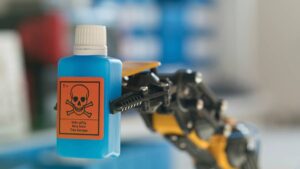Why Dicker Data believes ASX Tech is now in pole position

Pic: Getty Images
- Dicker Data COO Vladimir Mitnovetski is confident the ASX Tech sector will continue to grow with demand
- Mitnovetski believes in tough times organisations are using tech to optimising their operations
- Three themes driving the tech sector include artificial intelligence, cyber security and hybrid working
We are in the midst of the digital age, an era defined by tech advancements transforming the way we live, work and interact.
From widespread use of computers and the internet to the proliferation of smartphones and digital communication, the era has ushered in unprecedented connectivity and innovation.
The latest tech advancement is artificial intelligence (AI), which aims to perform tasks and problem-solving capabilities above human intelligence level in machines.
But tech in the 21st Century also has its challenges, including cybersecurity and ensuring enterprises have the latest hardware, software and innovative platforms to stay up with or ahead of their competition.
With so much going on, Dicker Data (ASX:DDR) chief operating officer Vladimir Mitnovetski believes the future is bright for the tech sector and investors looking for growth opportunities.
“Technology has now become a very big thing everywhere,” Mitnovetski told Stockhead.
“It used to be just tech companies doing technology but now every single company is a tech company.
“Technology has become such an integral part of living including family life, work life and hybrid working.”
From a 1970s visionary to now
A little background on DDR, which was was established in 1978 by CEO and chairman David Dicker and his ex-wife Fiona Brown, listing on the ASX in 2011.
According to Mitnovetski the now billionaire Dicker remains very much involved in the company, which is a value-added tech hardware, software, cloud, access, control and surveillance distributor to 10,200 IT re-sellers across Australia and New Zealand.
Dicker and Brown remain the largest shareholders of the ~$1.5 billion market cap DDR, each with individual holdings above 30%.
Dicker has sold off some of his holding in recent years to fund a very cool Bombardier Global XRS private jet in black and his other passion, fast cars.
Dicker, who has had a love of Formula One since the 1970s, missed out on buying the Williams Team in 2022, so in true innovator style decided he wanted the car company he founded in 1999 Rodin Cars to be a new Formula One team.
The Fédération Internationale de l’Automobile (FIA), the governing body which oversees motorsport, has begun an application process for teams seeking entry into Formula One, potentially upping the number of teams from 10 to 12.
Dicker, who also owns Carlin Motorspot, a competitor in Formula 3 and 4, should know if his bid to enter F1 is successful in July.
Many sheds at Dicker’s North Cantebury 550ha property on the South Island of New Zealand house his collection of Ferraris, Lamborghinis, Porsches and even a Lotus 125 F1 car. He also has a race track on the property (you’re probably not likely to drive a Lotus 125 up to the local shops).
Back to DDR and Mitnovetski
Mitnovetski first joined DDR in 2010 and is a prolific supporter himself. A quick look through DDR’s change of director’s interest notices shows the COO has also been steadily upping his stake in the company.
“We have an amazing diversified business with a portfolio of technologies under one roof,” he said.
“We’ve done a number of exciting acquisitions last year which will continue to bring a lot of success, opening up new markets and opportunities for us.”
While the business model for DDR hasn’t changed much in 45 years – still selling to resellers – Mitnovetski said the needs of customers certainly has evolved.
“People need to be connected but also secured,” he said.
“The key word here is complexity and it is incredibly complex.
“It used to be very simple with a couple of computer brands and software brands like Microsoft but now we are talking about thousands of specialised solutions.”
Mitnovetski said to make sense of it all, a common place where there is a lot of expertise along with products and solutions is needed, which is where Dicker Data positions itself.
“We are incredibly diverse with not only the products and solutions we are offering but expertise we have,” he said.
Move to subscription payment model
Mitnovetski said the way people consume tech is changing with subscription models being more popular, with DDR well positioned to adapt to this change.
“People don’t want to buy everything up front and want to only pay for what they use,” he said.
“We as a distributor provide an incredibly strong platform and marketplace for all our customers to utilise the subscription model.”
Rise of tech in 2023
While the tech sector outperformed during the pandemic pressures of 2020–21, it had a tough ride in 2022 rising inflation and interest rates took a toll on growth stocks in 2022.
But so far in 2023, tech has rebounded strongly, largely on the back on an artificial intelligence (AI) frenzy.
The S&P ASX 200 Information Technology sector was the top performing sector in May, up 11.6%. It has risen 16.94% YTD, compared to the benchmark S&P ASX 200 which fell 2.53% in May and is down 0.73% YTD.
Mitnovetski said he is not surprised by the rise in the tech sector this year, despite sticky inflation and rising interest rates.
“In tough times people are thinking of optimising their operations, bringing in efficiencies and trying to survive and you can’t do that without digitising and that is why we are in incredibly strong demand,” he said.
“During tough times organisations might start saving on different things like stop hiring people but if they stop spending on transforming their businesses, on cybersecurity, they risk being left behind and that is why the tech sector is thriving.
“I know the market is soft and there’s a lot of pessimism but being in the tech sector I see lots of opportunities.”
Three themes driving tech sector
Mitnovetski said artificial intelligence (AI), cybersecurity and hybrid working are the three big themes which are dominating the sector.
“Everyone is talking about those three incredibly big topics at the moment,” he said.
“Covid accelerated the whole digital transformation and especially hybrid working which is here to stay.”
He said the purpose of the office is changing and often even the name has changed in many organisations to collaboration spaces.
“The naming convention and mentality is changing,” he said.
Mitnovetski said through Covid the install base has doubled with both offices and home.
“Instead of having one place to work you now have at least two places with the office and home and then you can work from your car or anywhere really,” he said.
“Wherever you are you need to be connected, secured and have full quick access to platforms which allow you to be productive in your work.
“We’ve doubled the number of monitors we’ve deployed and notebooks so when the refresh cycle comes in that will represent another big opportunity.”
Mitnovetski said recent high profile cybersecurity hacks on companies like Optus and Medibank is further increasing demand for the tech sector.
“Covid, cyber attacks and hacking is the gift that keeps giving to the IT sector because it means we have so much more work to do,” he said.
“Last year we’ve had over $700 million of recurring revenue and its growing at double digit percentage point.”
Growing love affair with AI
NASDAQ-listed chipmaker Nvidia has been one of the top performing stocks of 2023, briefly reaching a market cap of $1 trillion upon release of its Q1 FY24 results in May and up 173% YTD as it leads a frenzy in AI investing on a global scale, fuelled by the release of Open AI’s ChatGPT in November 2022.
“AI makes all the decision making more optimised, more efficient with less degree of error so a lot of companies are getting onto it,” Mitnovetski said.
“It’s definitely the future there’s no question in my mind.”
Mitnovetski said for example a company looking to win a tender can use AI to come up with pricing more efficiently and with more precision than humans.
“It’s all about the input and programming,” he said.
He said data centres could also be a big winner from AI to process and get it back to the end user but increasingly data will also be processed where it is collected.
“It (AI) is collecting so much information and data that ultimately you are going to need bigger and stronger data centres to work on this data and get it back to the end user.”
“But if say a car is collecting data there is a responsibility it can transform that on the spot.
“The data doesn’t actually go to the data centre and that is another notion of where the future is going.”
Aussie tech sector needs more love
While the Aussie tech sector is growing Mitnovetski believes it could do with greater support and funding.
“If you look at the United States or Israel they are receiving so much funding and progression,” he said.
“It’s really hard to get money in this country and all the startups and innovators are struggling and that’s my personal opinion.
“There’s certain areas we are doing okay but overall, we can’t compare ourselves to some developed nations and the support they are getting.”
The Dicker Data share price today:
Related Topics
UNLOCK INSIGHTS
Discover the untold stories of emerging ASX stocks.
Daily news and expert analysis, it's free to subscribe.
By proceeding, you confirm you understand that we handle personal information in accordance with our Privacy Policy.








